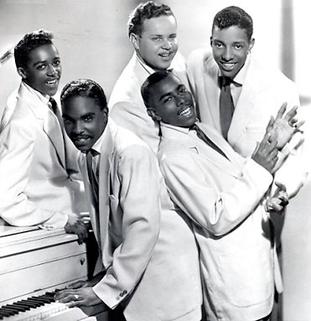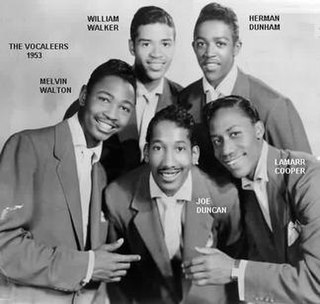
Doo-wop is a genre of rhythm and blues music that originated in African-American communities during the 1940s, mainly in the large cities of the United States, including New York, Philadelphia, Pittsburgh, Chicago, Baltimore, Newark, Detroit, Washington, D.C., and Los Angeles. It features vocal group harmony that carries an engaging melodic line to a simple beat with little or no instrumentation. Lyrics are simple, usually about love, sung by a lead vocal over background vocals, and often featuring, in the bridge, a melodramatically heartfelt recitative addressed to the beloved. Harmonic singing of nonsense syllables is a common characteristic of these songs. Gaining popularity in the 1950s, doo-wop was "artistically and commercially viable" until the early 1960s, but continued to influence performers in other genres.
The Belmonts are an American doo-wop group from the Bronx, New York, that originated in the mid-1950s. The original group consisted of Angelo D'Aleo, Carlo Mastrangelo, and Fred Milano. They took their name from Belmont, the Bronx street in which Mastrangelo lived, known as the Little Italy of the Bronx. There were several stages in their history, including the 1958–60 period with Dion DiMucci when the group was named Dion and the Belmonts. At this time Mastrangelo sang the bass parts, Milano the second tenor, D'Aleo the falsetto, and DiMucci did lead vocals.

The Flamingos are an American doo-wop group formed in Chicago in 1953. The band became popular in mid-to-late 1950s and are known for their 1959 cover version of "I Only Have Eyes for You". They have since been hailed as one of the finest and most influential vocal groups in pop and doo wop music history. In 2001, the band was inducted into the Rock and Roll Hall of Fame.
The Rivingtons were a 1960s doo-wop band, known for their 1962 novelty hit "Papa-Oom-Mow-Mow". The members were lead vocalist Carl White, tenor Al Frazier, baritone Sonny Harris and bassist Turner "Rocky" Wilson Jr. Frazier was replaced by Madero White for a period in the late 1970s.

Vito & the Salutations is an Italian/Irish/Jewish-American New York City doo-wop group from the 1960s. They began performing their four-part harmonies while still in high school, getting practice by singing in subways and at railroad stations. But they never expected anything to come of it, until one of the band members was introduced to someone at a local record company, and the band was asked to make some recordings. Their first popular record, "Gloria," was a regional hit. But Vito & the Salutations became best known for a surprise million-selling hit a year later, in the summer of 1963: they took "Unchained Melody," a 1955 hit ballad by Al Hibbler that they heard on the car radio, as they drove to perform at a concert, and transformed it into an up-tempo, doo-wop song. "Unchained Melody" reached number 66 on the Cash Box hit parade, and it made the top ten in many cities: for example, in New York City, the song reached #3 on top-40 powerhouse WABC. The record was originally released on Herald (H-583). The original group consisted of: Barry Solomon, Bob DiPaolo, Bobby Mitchel and Vito Balsamo That group broke up after their success with their song Gloria. Another group was formed by their manager Dave Rick. That second group consisted of: Frankie Fox, Sheldon Buchansky, Raymond JP Russell and Vito Balsamo. Balsamo came from an immigrant family: his parents were from Palermo, Italy and he grew up in Brooklyn, listening to opera. But he fell in love with rock and roll, much to the dismay of his parents. Vito joined a group and recorded his first song when he was only fifteen. The B side of "Unchained Melody" was "Hey, Hey, Baby," a tune composed by Murray Kanner, Frankie Fox and Dave Rick. Vito & the Salutations also performed their version of "Unchained Melody" on American Bandstand.
The Jive Five were an American doo-wop group. They are best known for their debut hit single, "My True Story" (1961), the Nickelodeon bumper jingles in the 1980s and 1990s, and the fact that they outlasted most of their musical peers by re-modeling themselves as a soul group in the 1970s and beyond.
The Spaniels were an American R&B and doo-wop group, best known for the hit "Goodnite, Sweetheart, Goodnite".
The Doo Wop Royal All Stars was formed in 1992 as one of the first "supergroups" in to the doo wop music genre, combining members from other groups. "It's a show within a show," remarked longtime WCBS FM deejay Bobby Jay. The group remains active today, with various members and led by Daniel Loria, son of founding member Art Loria. It originally performed and recorded as "The Royal All Stars", and has also been known as "Golden Group Memories".
Lawrence Figueiredo, better known as Larry Chance, was an American musician and the lead singer of the 1960s doo-wop group Larry Chance and the Earls, originally known as The Earls.
Hyman Y. "Hy" Weiss was an American record producer of pop and rhythm and blues music in the 1950s and 1960s, and the founder of Old Town Records.
The El Dorados were an American doo-wop group, who achieved their greatest success with the song "At My Front Door", a no. 1 hit on the US Billboard R&B chart in 1955.

The Solitaires were an American doo-wop group, best known for their 1957 hit single "Walking Along". Although they never had a national chart hit, they were one of the most popular vocal groups in New York in the late 1950s.
Johnnie & Joe were an American R&B vocal duo from The Bronx, New York, United States, who were best known for their 1957 hit "Over the Mountain; Across the Sea."
"Bad Girl" is a 1959 doo-wop single by The Miracles. Issued locally on the Motown Records label, it was licensed to and issued nationally by Chess Records because the fledgling Motown Record Corporation did not, at that time, have national distribution. It was the first single released on the Motown label – all previous singles from the company were released on Motown's Tamla label. Although The Miracles had charted regionally and on the R&B charts with several earlier songs, including "Got a Job", "I Cry", "I Need a Change", and "(You Can) Depend on Me", "Bad Girl" was their first national chart hit, reaching #93 on the Billboard Hot 100. Written by Miracles lead singer Smokey Robinson and Motown Records' President and Founder Berry Gordy, "Bad Girl" is a sad, remorseful ballad about a young woman, whom Robinson, as the narrator, says "was so good at the start", but who later in the song "is breaking my heart". It is in the popular doo-wop style, as several of The Miracles' songs were during the late 1950s. The record's success, coupled with the distributor's failure to pay Gordy and The Miracles properly for its sales, prompted Robinson to urge Gordy to "go national" with it, meaning that Motown should do its own national distribution of its songs, and eliminate the middleman, to ensure that all money from sales of its records would go directly to the label.
Cathy Jean and the Roommates are an American vocal group who recorded in the early 1960s, and had a US pop hit in 1961 with "Please Love Me Forever". A version of the group, fronted by original singer Cathy Jean Giordano, still performs.

Lillian Leach, also known by her married name, Lillian Leach Boyd, was an American singer who performed lead vocals with the Bronx-based doo-wop group the Mellows. She was noted for her mellifluous voice and wistful singing style. The Mellows recorded several hit songs in the 1950s, including "Smoke From Your Cigarette", "Yesterday's Memories", and "How Sentimental Can I Be?"

The Vocaleers were an American doo-wop group formed in Harlem, New York, in 1952. Managed by record producer Bobby Robinson, the group released a string of regional hits and scored one national R&B hit with the song "Is It a Dream" in 1953. Highlighted by the distinctive vocal delivery of Joe Duncan, "Is It a Dream" became a standard component of several R&B acts in Harlem and, briefly, the Vocaleers were among the most popular attractions of the city's music scene.
The Hollywood Saxons were a Los Angeles R&B group who recorded under various other names. They were well known on the LA R&B circuit. Their recording history ran from the late 1950s to the late 1960s. Their discography is complex due to the various names they recorded under and labels they recorded on.
Jimmy Merchant is an American singer and musician. He was a member of the doo-wop group The Teenagers. He was inducted into the Rock and Roll Hall of Fame in 1993 as a member of the Teenagers. He retired from The Teenagers in 2005.
The Bop Chords were a musical group from Harlem, New York, founded in 1955. They had a hit record titled Castle in the Sky.







